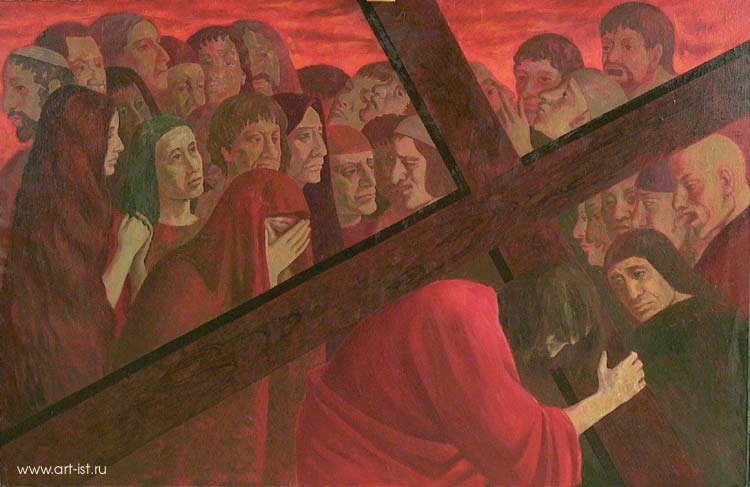“Carry each other’s burdens, and in this way you will fulfill the law of Christ.” ~Galatians 6:2
 It’s clear that the fourth Servant Song in the book of Isaiah (52:13-53:12) points forward to Christ Jesus. The passage carries the theme of the other three songs (42:1-9, 49:1-7, & 50:4-11) that the servant of God is chosen by God, equipped by God, and assigned by God to fulfill God’s mission of bringing salvation to the world. The servant belongs to God. He’s ordained by God to bring justice and salvation to God’s people. And all four songs express guarantees from God that God’s chosen way of the servant will not fail. It will succeed. God will make sure of it.
It’s clear that the fourth Servant Song in the book of Isaiah (52:13-53:12) points forward to Christ Jesus. The passage carries the theme of the other three songs (42:1-9, 49:1-7, & 50:4-11) that the servant of God is chosen by God, equipped by God, and assigned by God to fulfill God’s mission of bringing salvation to the world. The servant belongs to God. He’s ordained by God to bring justice and salvation to God’s people. And all four songs express guarantees from God that God’s chosen way of the servant will not fail. It will succeed. God will make sure of it.
As children of God and as followers of the Christ, we are also the servant described in the four songs. We are also chosen by God, called and equipped and empowered and ordained by God to be his vehicle of bringing justice and salvation to a sin-broken world. And it’s easy to draw the comparisons and parallels in the first three songs. The identification of the servant is ambiguous. Generic. It’s simple to say and believe that we’re able to live into the servant of those first three passages.
But what about the fourth?
Most of us know a lot of the fourth song by memory. The words and the rhythms of the verses almost soothe us with their familiarity.
Despised and rejected by men. A man of sorrows and familiar with suffering. Surely he took up our infirmities and carried our sorrows. He was pierced for our transgressions. Crushed for our iniquities. He bore the sin of many.
So the servant bore our sufferings. It’s for our transgressions, for our iniquities, that he suffered. The servant suffered in our place. The servant serves God in serving the sinner by taking the sinner’s place, by doing for the sinner what the sinner can’t do for himself.
That’s Jesus, not me.
Yes. And No.
Yes, that’s Jesus. But as a child of God and a follower of his Son, it’s you, too. And it’s me.
Yes, the suffering and death of Jesus is definitive and complete. But there’s more. And the more has to do with our participation in that suffering and death. The cross at Calvary where all the Isaiah 53 imagery really comes into focus is unrepeatable. But cross-bearing is not.
The servant in Isaiah—and Jesus as the ideal servant—willingly gives up his rights, willfully gives up his life so that others might have life. As his followers, as his imitators, we’re called to walk down the same road. Isn’t that what we do when we offer our bodies as living sacrifices? Isn’t this what Paul meant in Galatians 6:2?
It’s much easier to tell people where to get relief from their burdens. It’s easier to point people to help, to write a check, to make a call, to drive somebody somewhere and drop them off. That way, we don’t become involved with them. There’s no pain. No risk. No chance of suffering.
But that’s not the way of the Isaiah servant. That’s not the way of our Lord. Jesus didn’t tell us where to take our burdens. He took them.
“To this you were called, because Christ suffered for you, leaving you an example, that you should follow in his steps.” ~1 Peter 2:21
~~~~~~~~~~~~~~~~~~~~~~~~~~~~~~~~~~~~~~~~~~~~~~~~~~~~~~~~~~~~~~~
Check out this 30-second video. It’s a quick little news story about a softball game last month between Western Oregon University and Central Washington State. I think it has meaning to this idea of bearing each other’s burdens. Even if it doesn’t relate perfectly, it’s a really cool story. Just click here to get the video. It’s on Jeff Christian’s blog from the Glenwood Church in Tyler.
~~~~~~~~~~~~~~~~~~~~~~~~~~~~~~~~~~~~~~~~~~~~~~~~~~~~~~~~~~~~~~~
 The Rangers have won six series in a row. The last time that happened was in ’99. A playoff year. A Johnnie Oates year. Could it be…?
The Rangers have won six series in a row. The last time that happened was in ’99. A playoff year. A Johnnie Oates year. Could it be…?
I think the Stars have a better chance of beating Detroit in four straight.
Peace,
Allan
Leave a Reply